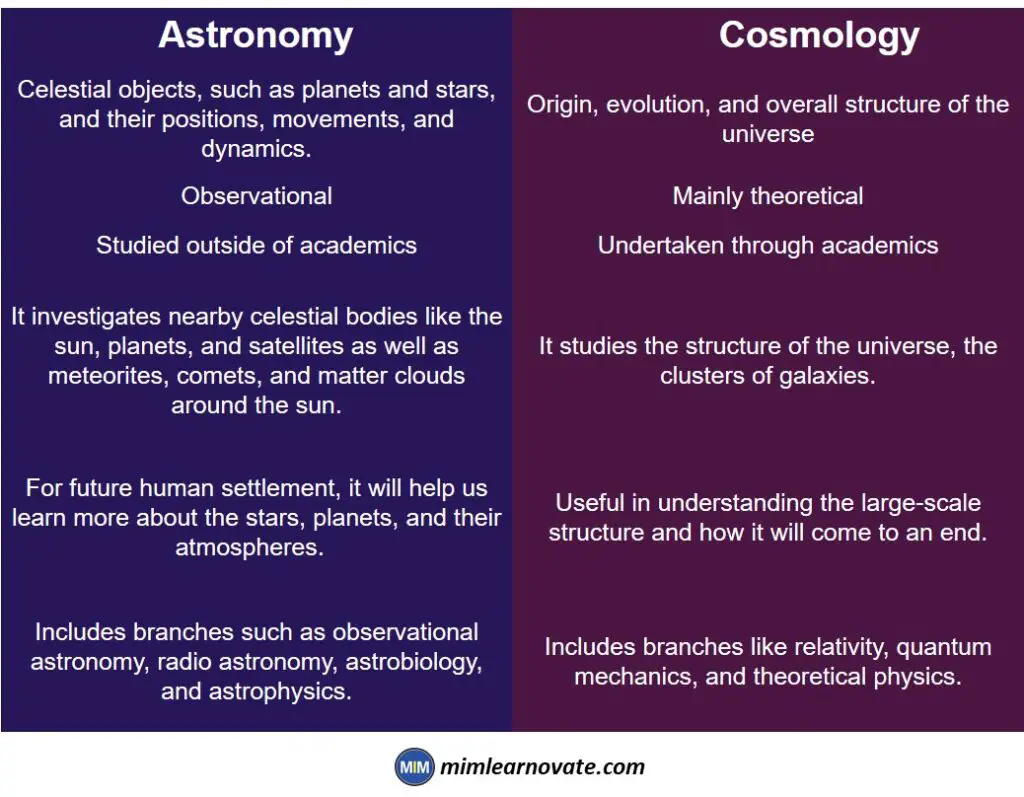Space is stunning in its vastness and complexity, with its solar systems, galaxies, stars, and planets. The fascination is quite understandable given the amount of information still undiscovered and the widespread perception that we still know very little.
Here, you will learn cosmology, astronomy — two of the main disciplines involved in the study of space. Because although the two of them are similar to one another and draw inspiration from one another, they are also slightly different. And everybody who is interested in space should be aware of the differences.
Astronomy
Astronomy, one of the first sciences, dates back to the beginning of human existence. Science emerged out of curiosity when early man started to map the paths of stars and planets in the sky and understood the repetitive patterns of their motions, which we now refer to as orbital motion, .
Astronomy covers exploration into the planets and universe, including ground-based research and stargazing.
Astronomy is frequently used as an umbrella term to refer to various sub-categories of studies, such as observational astronomy, radio astronomy, planetary astronomy, and astrobiology, and it focuses more on our galaxy and solar system.
Cosmology
With the discovery of the Big Bang and other significant advances in physics and mathematics in the late 1900s and early 2000s, cosmology was discovered.
Cosmology is a specialized field of study that focuses on the origin, structure, and end of the universe as a whole. As a result, the study is primarily theoretical. Science seeks to provide us with the knowledge necessary to comprehend the size of the universe and how it will eventually come to an end.
Cosmology investigates the creation and expansion of the universe. It attempts to answer the puzzle of how the universe came into being and how time got started. By taking into account the entirety of the universe, it is more concerned with how it was formed, how it has evolved, and how it will end.
Difference between Astronomy and Cosmology

Cosmology was developed considerably later in history, in the 20th century, when physics and mathematics became the foundation of the natural sciences. However, cosmology is not as simple and straightforward as astronomy.
The science of celestial bodies’ positions and motions in space is known as astronomy. Cosmology is the study of the overall structure, origin, and evolution of the cosmos that is universe as a whole.
Therefore, the primary distinction between cosmology and astronomy relates to the size of the the universe under study.
The main difference between astronomy and cosmology is that astronomers are concerned with the dynamics and functioning of objects like planets, stars, black holes, and galaxies whereas cosmologists are concerned with the origin of the universe.
Evolution of Astronomy and Cosmology
Astronomy evolved over time. It all began when a caveman first began to observe the skies and pondered the tiny stars and hazy patches that were steadily moving in a repetitive manner around the earth. By the end of the twentieth century, astronomy had reached its peak.
The study of astronomy is more observational than theoretical. Cosmological ideas rely more on advanced physics and mathematics than they do on observational data. Theories such as the big bang theory were first developed theoretically and then confirmed with observational data.
Calendars have been made using astronomy, which was primarily an observational science. With the growing understanding of physics in the 18th and 19th centuries, it continued to advance and deepen.
Astronomy became a hot issue and a significant science of discussion during the 20th century’s interest of scientific endeavor and advancement. Increased interest in old astronomers such as Kepler, Galileo, and Copernicus, as well as recent developments, have made astronomy a well-known science worldwide.
Cosmology has a reputation for being highly theoretical and challenging to understand or study without a strong background in mathematics. The developments that took place in the latter half of the 20th and the beginning of the 21st centuries were astounding. For instance, the general public was shocked to learn that the universe was created in a massive explosion and that it is constantly expanding.
Astrophysics: Extension of astronomy
Astrophysics is a branch of astronomy that combines observational and theoretical astronomy.
Astronomy > Astrophysics > Cosmology
This ascending order of study provides a useful difference of the distinction between astronomy and cosmology.
Astronomy vs. Cosmology
| Astronomy | Cosmology |
| Celestial objects, such as planets and stars, and their positions, movements, and dynamics. | Origin, evolution, and overall structure of the universe |
| Observational | Mainly theoretical |
| Studied outside of academics | Undertaken through academics |
| It investigates nearby celestial bodies like the sun, planets, and satellites as well as meteorites, comets, and matter clouds around the sun. | It studies the structure of the universe, the clusters of galaxies. |
| For future human settlement, it will help us learn more about the stars, planets, and their atmospheres. | Useful in understanding the large-scale structure and how it will come to an end. |
| Includes branches such as observational astronomy, radio astronomy, astrobiology, and astrophysics. | Includes branches like relativity, quantum mechanics, and theoretical physics. |



